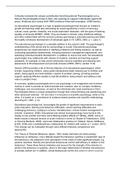Essay
Educational psychology essay
- Course
- Institution
Critically evaluate the unique contribution that Educational Psychologists (a.k.a. School Psychologists) bring in their role working to support individuals aged 0-25 years. Illustrate your essay with TWO evidence-informed examples. (1500 words) Achieved a 2:1
[Show more]



